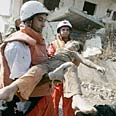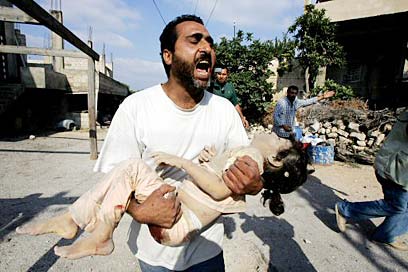
World newspapers: How can we stand by?
Editorials of leading global newspapers slam Israel a day after Qana village bombing. 'How can terrorism be condemned while war crimes go without rebuke?' British Guardian asks
The British Independent, for example, published an editorial by Robert Fisk under the title: "How can we stand by and allow this to go on?"
"You must have a heart of stone not to feel the outrage that those of us watching this experienced yesterday. This slaughter was an obscenity, an atrocity yes, if the Israeli air force truly bombs with the 'pinpoint accuracy'' it claims, this was also a war crime," Fisk said.
"Israel claimed that missiles had been fired by Hizbullah gunmen from the south Lebanese town of Qana as if that justified this massacre. Israel's Prime Minister, Ehud Olmert, talked about 'Muslim terror' threatening 'western civilization' as if the Hizbullah had killed all these poor people," he added.
Another British newspaper, the Guardian, also published an editorial titled: "How can 'terrorism' be condemned while war crimes go without rebuke?"
"Washington's partners in this hypocritical war on terror are given free rein to wreak their own brutal, illegal violence. As if we didn't know it already, the conflict in Lebanon shows that truth and war don't mix. All parties to the tragedy of the Middle East resort to disinformation and historical falsification to bolster their case, but rarely has an attempt to rewrite the past occurred so soon after the fact.
"Israeli ministers and their supporters have justified the bombardment of Lebanon as 'a matter of survival.' Total war has been declared on Israel, so Israel is entitled to use the methods of total war in self-defense. This would be reasonable if it were true, but it isn't. It's completely false.
"The conflict was triggered by a Hizbullah operation in which two Israeli soldiers were captured and three killed. Let's be frank, this wasn't exactly the Tet offensive. It certainly didn't justify Israel's ferocious onslaught against the very fabric of Lebanese society. Yes, the rocket attacks on Haifa are an appalling crime, but they followed rather than preceded Israel's decision to escalate the fighting."
Ed O'Loughlin, the Sydney Morning Herald's correspondent in Qana, wrote an article titled: "Slow, patient toil, and another body is found."
"Rescuers clawed at the rubble with their hands until help came from the Red Cross, Lebanese Army and locally based UN peacekeepers after Israeli bombing killed 54 people in the southern Lebanese town of Qana.
"Local people said that 63 members of the Chalhoub and Hashem families had been sheltering in the basement of one house when the attack occurred at 1.30 in the morning. Hours later, rescuers were still tunneling into the compressed rubble that had once been the basement where the civilians took refuge.
"Slow, patient toil turned into flurries of activity whenever a new body was reached: one little blond boy of about three years was placed limply on a stretcher by a Red Cross volunteer, his dummy still attached to his shirt by a plastic chain."

Picture that shocked the world (Photo: Reuters)
Former German Foreign Minister Joschka Fischer wrote a special opinion piece for the Chicago Tribune following the Qana village bombing, titled: "Can a lasting peace rise from the rubble of war?"
"Haifa, Beirut and many other Lebanese and Israeli towns and villages are under fire," he wrote. "Who would have thought this possible a few weeks ago?"
"Hizbullah was well known to have been stockpiling Katyusha rockets, as well as longer-range guided missiles. And it is no secret that Hizbullah operates as a state within a state, with its highly motivated private army and terrorist structures. Indeed, Hizbullah, not the Lebanese government and its army, has controlled the Lebanese-Israeli border ever since Israel's withdrawal in 2000.
"Although Hizbullah has two ministers in the Lebanese government and several members in parliament, it does not act in the interest of the Lebanese state. Rather, its interests are defined in Damascus and Tehran, where much of its arsenal originates. This outside control is why the present tragedy constitutes a 'proxy war.' Who is acting as a proxy for whom and for what?"
The Washington Post published an article titled: "A refuge that became a place of death." The reporter focused on a melancholic and emotional description of the demolished building and the evacuation of the bodies.
"The bulldozer slowly clawed at the rubble Sunday, in motions gentle for a machine. In its path were what was left of life: A bag of onions and a can of beans, a dirt-crusted sandal, a baby bottle, a plaid bag with a diaper still tucked inside and a punctured picture of a young boy, posing awkwardly, his arms stiff at his side.
"As the sun arced overhead, Israeli shelling thundering in the distance, the shouts went out: 'Stop! Stop!' Rescuers surged, then one emerged, his back slightly stooped. Cradled in his arms was the 27th victim pulled from a partially buried room that had sheltered 63 people in the southern Lebanese village of Qana. The victim's name was Abbas Hashem, and he was 1 year old. His blue pacifier still dangled from his green tank top.
"Behind the pair was a book, tossed by the blast into a splintered olive tree.'The Keys to Heaven,' its title read."










